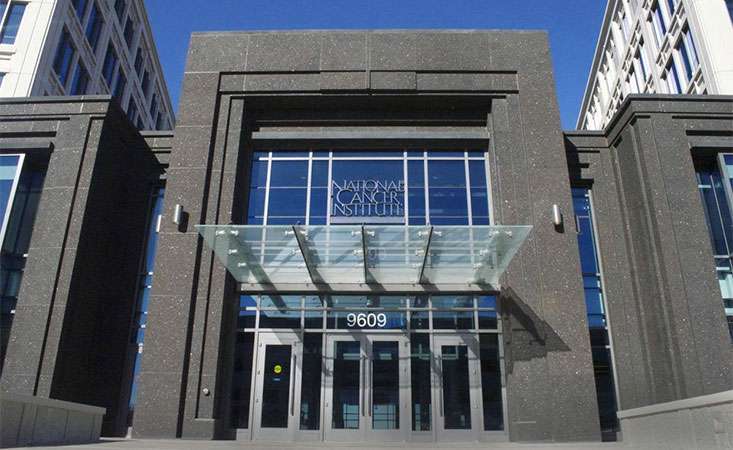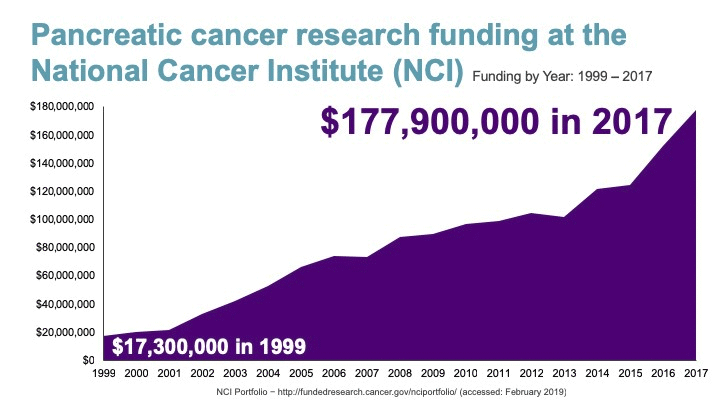
Photo: National Cancer Institute/National Institutes of Health
Nearly $178 million was invested in pancreatic cancer research by the National Cancer Institute (NCI) in 2017 – a 17 percent increase over the previous year, according to recently released figures.
“Everyone who’s participated in advocacy efforts with the Pancreatic Cancer Action Network (PanCAN) – whether advocating on Capitol Hill during National Pancreatic Cancer Advocacy Day, visiting your local legislators or sending a direct message to your members of Congress – has helped make this happen,” said Meaghan Slater, associate director of advocacy at PanCAN.
“About 80 percent of all pancreatic cancer research funding comes from the federal government, with the majority coming from the NCI,” Slater added. “It’s of utmost importance to ensure resources and focus continue for the world’s toughest cancer.”
Since the Recalcitrant Cancer Research Act was signed into law in 2013, when $101 million was dedicated to the disease, NCI research funding for pancreatic cancer has increased markedly. The 2017 figure represents the most recent data available from the NCI – and shows a remarkable 900 percent increase since PanCAN’s founding in 1999.

“In addition to the passage of the Recalcitrant Cancer Research Act, which required the NCI to create a ‘scientific framework’ for pancreatic cancer, PanCAN has played an important role in building and strengthening a Community for Progress of scientists dedicated to studying this disease,” Slater said.
“More researchers are focused on pancreatic cancer than ever before, and private funding like ours helps them gather the necessary preliminary data to receive large-scale awards from the NCI.”
Cosimo Commisso, PhD, an assistant professor at Sanford Burnham Prebys Medical Discovery Institute, knows firsthand how PanCAN funding can impact researchers’ abilities to get federal funding.
“Receiving the Career Development Award from PanCAN showed my institution – and other funding agencies – that I could get an independent grant right away,” he said.
“The federal funding that I’ve received since then is critical to sustain the lab, allow the research to continue and help me focus on the science.”
Registration is open for this year’s Advocacy Day, June 24-25, in Washington, D.C.
Advocacy Day is the opportunity for you and other advocates to fight for much-needed progress to improve patient outcomes. Increased federal funding for cancer research is the key to scientific breakthroughs – and to saving more lives.

Cosimo Commisso, PhD, with PanCAN’s former Board of Directors chair, Laurie MacCaskill, and president and CEO, Julie Fleshman, JD, MBA, at a past Advocacy Day event.
As a past Advocacy Day attendee, Commisso commends PanCAN’s volunteers and advocates for their efforts to make Congress and the NCI aware of the urgent need for progress in pancreatic cancer research. “Advocating for research funding is one of the most effective and impactful things people can do to make a difference in this disease,” he said.
“We’re delighted to see the continued increased investment by the NCI into pancreatic cancer,” Slater said, “but the reality remains that the five-year survival rate is only 9 percent.”
She added, “A deeper biological understanding of the disease, made possible through scientific and clinical discoveries, will facilitate the development of early detection tools and more effective treatments to improve outcomes for everyone faced with a pancreatic cancer diagnosis.”
















